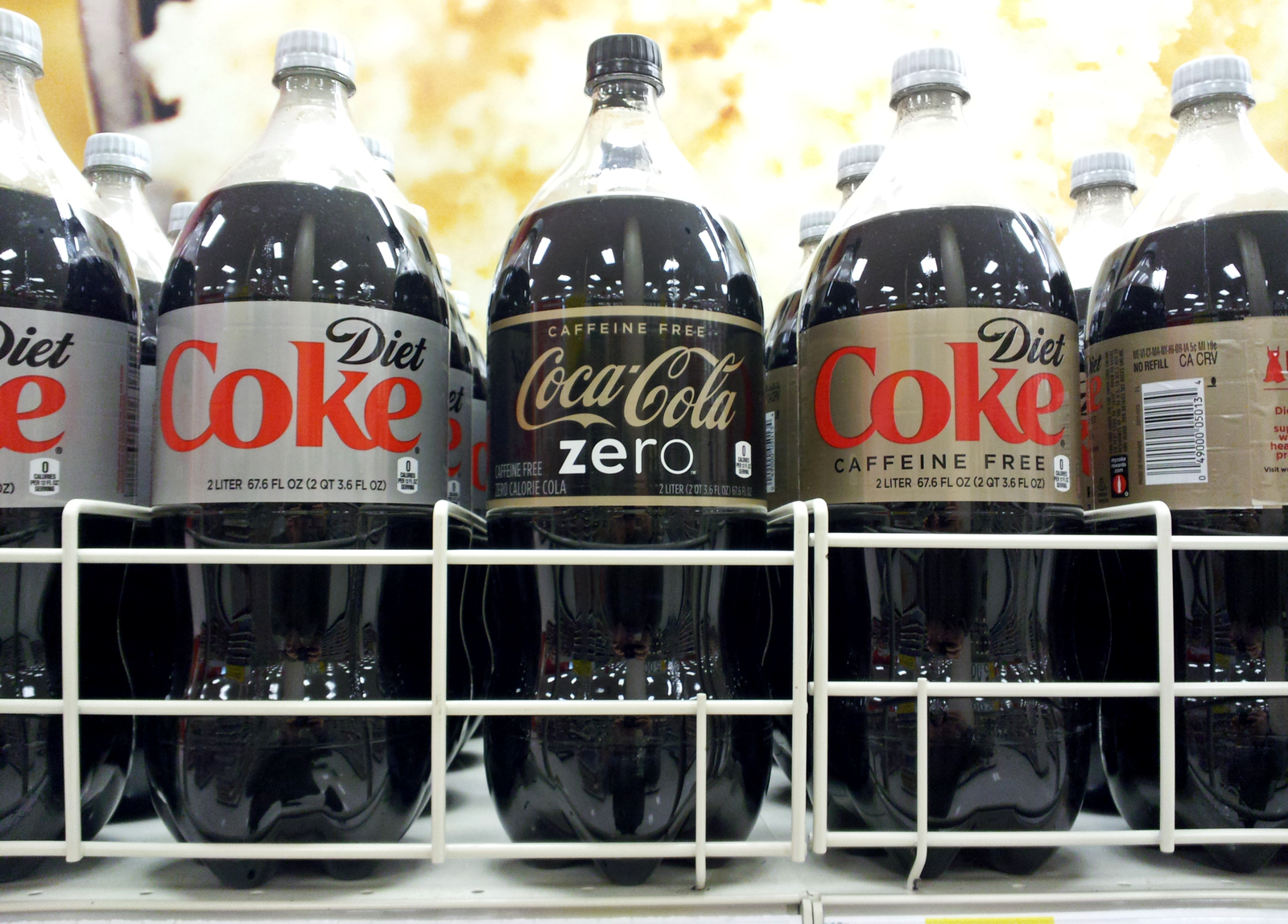“Limited evidence” for aspartame as “possible carcinogen,” says WHO cancer agency

Two-liter bottles of Diet Coke, caffeine-free Coca-Cola Zero, and caffeine-free Diet Coke on a shelf at the Target store in Wheaton, Maryland. WIKIMEDIA COMMONS/Ben Schumin
July 16 (ZFJ) — The World Health Organization’s cancer research agency categorized non-sugar sweetener aspartame as “possibly carcinogenic to humans” (group 2B) based on “limited evidence” for causing cancer in humans on Friday, July 14. A WHO joint panel did not change its acceptable daily limit of 40 mg/kg body weight.
Aspartame is an artificial sweetener that has been widely used in foods and beverages since the 1980s as an alternative to sugar. It is a dipeptide composed mainly of two amino acids, phenylalanine, and aspartic acid (combining phenylalanine and aspartic acid results in an intensely sweet taste). Some products that use it include diet drinks, chewing gum, gelatin, ice cream, dairy products, breakfast cereal, toothpaste, cough drops, and chewable vitamins.
“The assessments of aspartame have indicated that, while safety is not a major concern at the doses which are commonly used, potential effects have been described that need to be investigated by more and better studies,” said Dr. Francesco Branca, director of the WHO Department of Nutrition and Food Safety.
The International Agency for Research on Cancer focuses on identifying the properties of an agent and its potential to cause cancer. It generally uses the group 2B classification “when there is limited, but not convincing, evidence for cancer in humans or convincing evidence for cancer in experimental animals, but not both,” according to the WHO.
There were only three studies that examined an association between aspartame and hepatocellular carcinoma, a type of liver cancer. These studies found a “positive association” between drinking artificially sweetened beverages (considered a proxy for aspartame exposure), but the IARC could not rule out “chance, bias, or confounding” as explanations for the results.
Three studies involving experimental animals (mouse and rat) found “an increased incidence of tumours,” but the IARC had “concerns over the study design, interpretation, and reporting of data” and thus did not consider the evidence conclusive.
The IARC did note that there is evidence aspartame “exhibits key characteristics of carcinogens.” For example, in experimental systems, it causes “oxidative stress,” “chronic inflammation,” and “alters cell proliferation, cell death, and nutrient supply.”
“The findings of limited evidence of carcinogenicity in humans and animals, and of limited mechanistic evidence on how carcinogenicity may occur, underscore the need for more research to refine our understanding on whether consumption of aspartame poses a carcinogenic hazard,” said Dr. Mary Schubauer-Berigan, head of the IARC Monographs program.
The Joint WHO/Food and Agriculture Organization Expert Committee on Food Additives focuses on risk assessment, or the likelihood that an agent will cause harm under certain conditions and exposure levels.
The JECFA did not find “convincing evidence from experimental animal or human data” to change the acceptable daily intake of 0-40 mg/kg body weight.
So, a 70 kg adult would need to consume over 9-14 cans of diet soft drink with 200-300 mg of aspartame to exceed the recommended ADI.
The JECFA observed that aspartame is fully hydrolyzed (broken down) into three metabolites—phenylalanine, aspartic acid, and methanol—so “there is no systemic exposure to aspartame after dietary exposure.” These components are “also released from commonly consumed foods by enzymatically catalyzed hydrolysis.”
Aspartame’s genotoxicity (ability to damage genetic information and cause mutations) has been studied before. Based on “the conflicting results and the limited quality of the studies,” the JECFA did not find aspartame to be genotoxic.
The JECFA observed that “statistically significant increases were reported for some cancers,” but “a consistent association between aspartame consumption and a specific cancer type could not be demonstrated.”
“JECFA concluded that the evidence of an association between aspartame consumption and cancer in humans is not convincing,” said Dr. Moez Sanaa, WHO’s head of the Standards and Scientific Advice on Food and Nutrition Unit.
The U.S. Food and Drug Administration, responsible for regulating food safety, disagreed with IARC’s conclusion that aspartame is possibly carcinogenic and pointed out that Canada and the European Union also believe the sweetener is safe.
“FDA scientists do not have safety concerns when aspartame is used under the approved conditions,” the U.S. agency said.
The International Council of Beverages Associations, representing beverage companies that operate in over 200 countries, welcomed the WHO’s findings.
“After rigorous review, this landmark WHO and FAO finding further strengthens confidence in the safety of aspartame and will play a vital role in informing consumers as they consider all options to reduce sugar and calories in their diets,” said ICBA Executive Director Kate Loatman.
The WHO continues to recommend not to use non-sugar sweeteners as “means of achieving weight control or reducing the risk of noncommunicable diseases” such as type 2 diabetes, cardiovascular diseases, and premature mortality.
References
- World Health Organization - Aspartame hazard and risk assessment results released - https://www.who.int/news/item/14-07-2023-aspartame-hazard-and-risk-assessment-results-released (ARCHIVE)
- World Health Organization - Summary of findings of the evaluation of aspartame at the International Agency for Research on Cancer (IARC) Monographs Programme’s 134th Meeting, 6–13 June 2023 and The JOINT FAO/WHO EXPERT COMMITTEE ON FOOD ADDITIVES (JECFA) 96th meeting, 27 June–6 July 2023 - https://www.iarc.who.int/wp-content/uploads/2023/07/Summary_of_findings_Aspartame.pdf (ARCHIVE)
- The Lancet Oncology - Carcinogenicity of aspartame, methyleugenol, and isoeugenol - https://www.thelancet.com/journals/lanonc/article/PIIS1470-2045(23)00341-8/fulltext (ARCHIVE)
- Joint WHO/FAO Expert Committee on Food Additives - JOINT FAO/WHO EXPERT COMMITTEE ON FOOD ADDITIVES Ninety-sixth meeting (Safety evaluation of certain food additives) 27 June–6 July 2023 SUMMARY AND CONCLUSIONS - https://cdn.who.int/media/docs/default-source/food-safety/jecfa/summary-and-conclusions/jecfa96-summary-and-conclusions.pdf?sfvrsn=f7b61f6c_4&download=true (ARCHIVE)
- Joint WHO/FAO Expert Committee on Food Additives - Evaluations of the Joint FAO/WHO Expert Committee on Food Additives (JECFA) - Aspartame - https://apps.who.int/food-additives-contaminants-jecfa-database/Home/Chemical/62 (ARCHIVE)
- U.S. Food and Drug Administration - Aspartame and Other Sweeteners in Food - https://www.fda.gov/food/food-additives-petitions/aspartame-and-other-sweeteners-food (ARCHIVE)
- International Council of Beverages Associations - ASPARTAME SAFE, REAFFIRM WHO AND FAO - https://www.icba-net.org/resources/icba-statement-on-who-and-fao-affirming-aspartame-is-safe/ (ARCHIVE)
